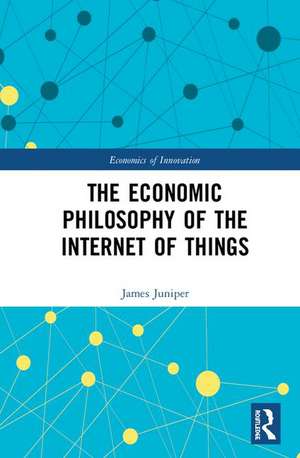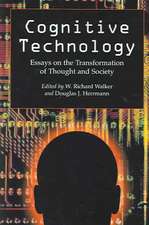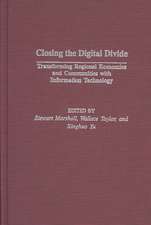The Economic Philosophy of the Internet of Things: Routledge Studies in the Economics of Innovation
Autor James Juniperen Limba Engleză Hardback – 27 iun 2018
The book provides the context—both philosophical and mathematical—for the construction and application of new, rigorous, and meaningful analytical tools. In terms of social theory, it adopts a Post-Cognitivist approach, the elements of which include the nature philosophy of Schelling, Marx’s critique of political economy, Peircean Pragmatism, Whitehead’s process philosophy, and Merleau-Ponty’s phenomenology of the flesh, along with cognitive scientific notions of embodied cognition and neural Darwinism, as well as more questionable notions of artificial intelligence that are encompassed by the rubric of "perception-and-action-without-intelligence".
| Toate formatele și edițiile | Preț | Express |
|---|---|---|
| Paperback (1) | 330.56 lei 6-8 săpt. | |
| Taylor & Francis – 14 aug 2020 | 330.56 lei 6-8 săpt. | |
| Hardback (1) | 1045.28 lei 6-8 săpt. | |
| Taylor & Francis – 27 iun 2018 | 1045.28 lei 6-8 săpt. |
Din seria Routledge Studies in the Economics of Innovation
- 9%
 Preț: 935.05 lei
Preț: 935.05 lei -
 Preț: 332.43 lei
Preț: 332.43 lei -
 Preț: 312.34 lei
Preț: 312.34 lei -
 Preț: 327.19 lei
Preț: 327.19 lei -
 Preț: 236.27 lei
Preț: 236.27 lei -
 Preț: 324.67 lei
Preț: 324.67 lei - 20%
 Preț: 277.33 lei
Preț: 277.33 lei - 20%
 Preț: 327.62 lei
Preț: 327.62 lei -
 Preț: 381.77 lei
Preț: 381.77 lei - 18%
 Preț: 1004.72 lei
Preț: 1004.72 lei -
 Preț: 389.66 lei
Preț: 389.66 lei - 18%
 Preț: 892.78 lei
Preț: 892.78 lei - 21%
 Preț: 256.04 lei
Preț: 256.04 lei - 18%
 Preț: 1000.13 lei
Preț: 1000.13 lei - 18%
 Preț: 1004.72 lei
Preț: 1004.72 lei -
 Preț: 391.18 lei
Preț: 391.18 lei - 20%
 Preț: 328.79 lei
Preț: 328.79 lei -
 Preț: 388.30 lei
Preț: 388.30 lei - 18%
 Preț: 1002.36 lei
Preț: 1002.36 lei - 9%
 Preț: 936.08 lei
Preț: 936.08 lei -
 Preț: 387.42 lei
Preț: 387.42 lei - 18%
 Preț: 1002.80 lei
Preț: 1002.80 lei -
 Preț: 378.34 lei
Preț: 378.34 lei - 18%
 Preț: 1005.17 lei
Preț: 1005.17 lei - 18%
 Preț: 997.45 lei
Preț: 997.45 lei - 18%
 Preț: 998.53 lei
Preț: 998.53 lei -
 Preț: 324.67 lei
Preț: 324.67 lei - 18%
 Preț: 1006.73 lei
Preț: 1006.73 lei - 15%
 Preț: 258.59 lei
Preț: 258.59 lei - 20%
 Preț: 1048.41 lei
Preț: 1048.41 lei - 20%
 Preț: 330.56 lei
Preț: 330.56 lei - 18%
 Preț: 948.53 lei
Preț: 948.53 lei
Preț: 1045.28 lei
Preț vechi: 1306.59 lei
-20% Nou
Puncte Express: 1568
Preț estimativ în valută:
200.08€ • 217.40$ • 168.17£
200.08€ • 217.40$ • 168.17£
Carte tipărită la comandă
Livrare economică 21 aprilie-05 mai
Preluare comenzi: 021 569.72.76
Specificații
ISBN-13: 9781138478176
ISBN-10: 1138478172
Pagini: 258
Ilustrații: 47 Line drawings, black and white; 6 Tables, black and white
Dimensiuni: 156 x 234 x 20 mm
Greutate: 0.45 kg
Ediția:1
Editura: Taylor & Francis
Colecția Routledge
Seria Routledge Studies in the Economics of Innovation
Locul publicării:Oxford, United Kingdom
ISBN-10: 1138478172
Pagini: 258
Ilustrații: 47 Line drawings, black and white; 6 Tables, black and white
Dimensiuni: 156 x 234 x 20 mm
Greutate: 0.45 kg
Ediția:1
Editura: Taylor & Francis
Colecția Routledge
Seria Routledge Studies in the Economics of Innovation
Locul publicării:Oxford, United Kingdom
Public țintă
Postgraduate and UndergraduateCuprins
Introduction: Post-Cognitivism and the Digital Economy; Chapter One: Transcendental Empiricism: From Schelling to Benjamin and Bloch; Chapter Two: Bourdieu and Structuralism; Chapter Three: ‘Co-Creation’ in the Creative Industries: a New Neoliberal Technology of Self?; Chapter Four: Neoliberalism, ‘Digitization’, and Creativity: the Issue of Applied Ontology; Chapter Five: Ubiquitous Computing Systems and the Digital Economy; Chapter Six: The Use of Diagrammatic Reasoning in Teaching Economics for the Digital Economy; Chapter Seven: Category-theoretic Approaches to Semantic Technologies; Technical Appendix: Category Theory and Sematic Technology; Chapter Eight: Conclusion; Glossary
Notă biografică
James Juniper is a lecturer at the University of Newcastle, NSW, Australia.
Descriere
This book contends that neoclassical approaches to modelling economic behaviour based on optimal control by "representative-agents" are ill-suited to a world typified by concurrency, decentralized control, and interaction. It argues for the development of new, process-based approaches to analysis, modelling and simulation and provides the context for the construction and application of new, rigorous, and meaningful analytical tools. It develops a critical understanding of the digital economy grounded in a Post Cognitive framework; bridging disciplinary domains of cognitive science, theoretical computing, social theory and political economy, by grounding analysis in a philosophical framework.



















